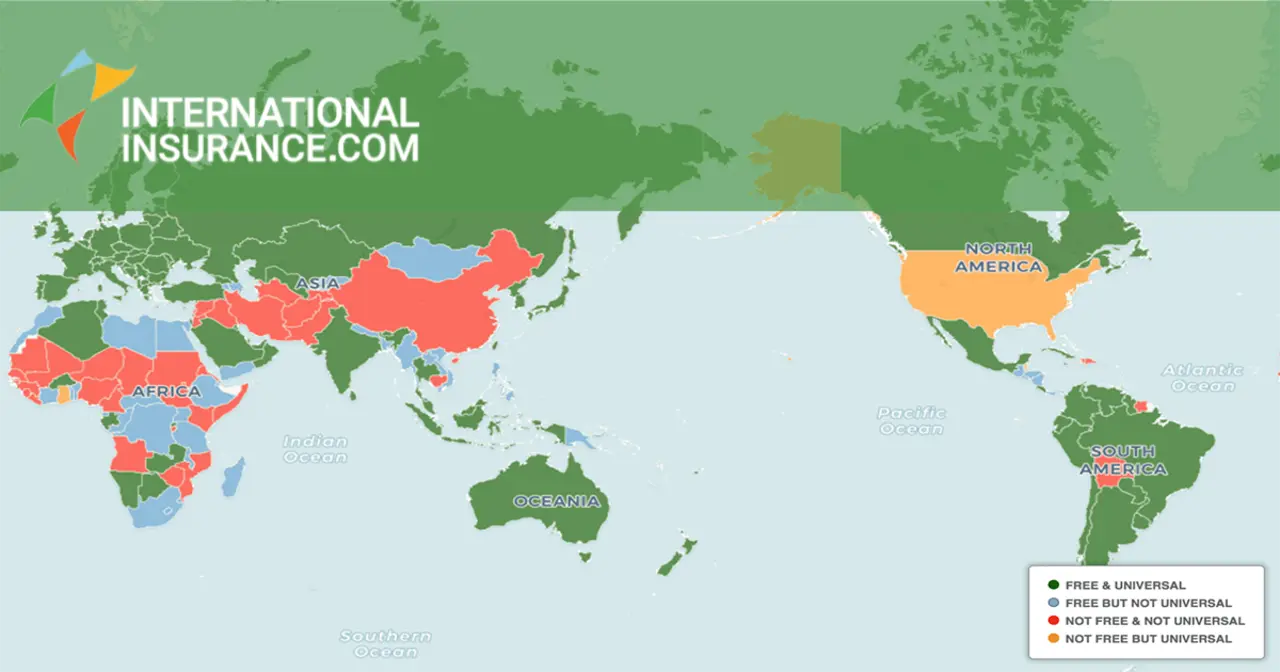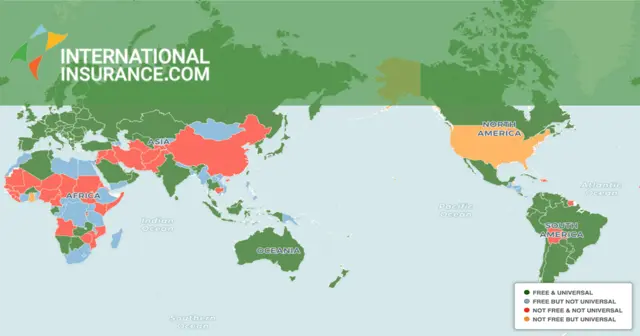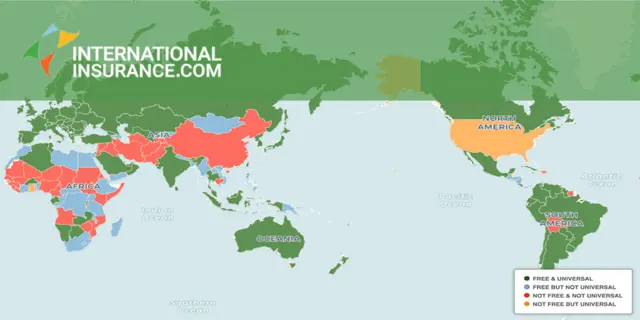
Why do many Americans seem to be against free health care?
The Pros and Cons of Free Health Care in America
The idea of free health care has been a hotly contested topic in the United States for many years. On one hand, free health care would provide a level of security and peace of mind for millions of citizens who would no longer have to worry about the cost of medical care. On the other hand, critics of free health care argue that it would be too expensive and would lead to increased taxes and a decreased quality of care.
The Pros of Free Health Care in America
One of the main advantages of free health care is that it would provide access to medical care to those who would otherwise be unable to afford it. For example, individuals who are unemployed, under-employed, or who cannot afford private health insurance would be able to access medical care without having to worry about the cost. Additionally, free health care would help reduce the number of uninsured individuals in the U.S., which would in turn reduce the amount of money spent on uncompensated care.
Another benefit of free health care is that it would reduce the financial burden on families who are already struggling to make ends meet. For many families, the cost of health care is a major financial strain, and free health care would help relieve this burden. Additionally, free health care would reduce the amount of medical debt that is accrued every year, which would help to improve the financial stability of many households.
The Cons of Free Health Care in America
One of the main drawbacks of free health care is that it would be expensive to implement and maintain. This cost would likely be passed on to taxpayers, which could lead to increased taxes. Additionally, critics of free health care argue that it would decrease the quality of care due to the increased demand that would be placed on the system.
Another potential downside of free health care is that it could lead to an increase in fraudulent claims. Currently, private health insurers are able to identify and reject fraudulent claims. However, with free health care, these safeguards would no longer be in place, and this could lead to an increase in fraudulent claims.
Finally, free health care could lead to long wait times for medical appointments. Currently, individuals are able to book appointments at their convenience, but with free health care, the demand for appointments could increase dramatically, leading to longer wait times.
Conclusion
The debate over free health care in the United States is complex and there are both advantages and disadvantages to implementing it. On one hand, it could provide access to medical care for those who otherwise wouldn’t be able to afford it, and it could also reduce medical debt and the financial burden on families. On the other hand, it could be expensive to implement and maintain, and it could lead to an increase in fraudulent claims and long wait times for appointments.
Examining the Reasons Behind Opposition to Free Health Care in the US
For many years now, there has been a heated debate over the issue of free health care for all Americans. There are those who strongly support the idea, citing a need to provide basic health care for all citizens, regardless of their economic status, while others vehemently oppose the concept, citing issues such as cost and potential government interference in personal medical decisions.
Given the strong emotions on both sides of the issue, it is important to look more closely at the arguments against free health care in the United States. There are a number of reasons why many Americans seem to be against free health care and these need to be considered before any decisions are made.
Cost Concerns
The cost of providing free health care to all Americans is a major concern for many people. It is estimated that implementing a universal health care system would cost the government billions of dollars every year. This money would have to come from taxpayers, which many people see as an unfair burden. People are also concerned that the cost of health care would go up if it were free, as providers would have to absorb the cost of providing care to those who can’t pay. This could lead to higher insurance premiums and higher taxes, which many people see as an unnecessary burden.
Government Interference
Another concern that many people have about free health care is the potential for government interference in personal medical decisions. If the government were to provide free health care, it could have a say in what kinds of treatments and medications are available, which could limit the range of choices for patients. This could also lead to a situation where the government is deciding who does and does not get care, which could lead to unfair discrimination.
Quality of Care
Many people are also concerned about the quality of care that would be provided in a free health care system. It is likely that the government would not be able to provide the same level of care that is available in private health care systems, as it would not have the same resources or access to the latest treatments. This could lead to poorer quality care, which could have serious implications for the health of those who need it the most.
Conclusion
Clearly, there are a number of valid arguments against free health care in the United States. While there are certainly benefits to providing access to health care for all citizens, there are also legitimate concerns that need to be taken into consideration. It is important to weigh all of the arguments before making any decisions about the future of health care in the United States.
The Financial Impacts of Free Health Care in the US
The idea of free health care in the US has been a hot button issue for a long time. Many people are for it and many more are against it. But why? One of the biggest reasons why many Americans are against free health care is the financial implications.
The first financial impact of free health care is that it would be incredibly expensive. In order to provide universal coverage, the government would have to spend a lot of money. This money would have to come from somewhere, and the most likely source is taxes. This means that taxpayers would be responsible for footing the bill for free health care, and many Americans are not willing to pay more taxes for this.
Another financial impact of free health care is that it could lead to lower quality care. While free health care would be a great benefit to many people, it could also lead to long wait times and overcrowded hospitals. This could lead to people not getting the care they need when they need it, resulting in worse outcomes.
Finally, free health care could lead to an increased demand for health care services. This could lead to a shortage of doctors and nurses, resulting in higher wages for them. This could lead to an overall increase in health care costs as providers have to pass on the cost of higher wages to their patients.
All of these financial impacts of free health care in the US are why so many people are against it. It would be incredibly expensive to implement, it could lead to lower quality care, and it could lead to higher health care costs overall. For these reasons, many Americans are against the idea of free health care in the US.
Exploring the Political and Social Issues Surrounding Free Health Care in America
Free health care is an issue that has been debated in the United States for many years now. With the rise in healthcare costs, many Americans are looking for solutions to the problem. While some are for the idea of providing free health care to all citizens, others are strongly against it. Let's take a look at some of the political and social issues surrounding free health care in America.
The Cost of Free Health Care
One of the primary arguments against free health care is the cost. Free health care requires a lot of money to fund, and some people are worried that it would take away funds from other important services. They are also concerned that taxes would have to be increased to cover the cost of free health care, which would be a burden on many people.
The Quality of Care
Another issue that has been raised is the quality of care that would be provided. Some people are concerned that free health care would lead to a lower quality of care, as resources may be stretched too thin. They worry that those who need more specialized care may not get the care they need, and that the quality of care overall may suffer.
The Impact on the Economy
Another concern is the impact free health care would have on the economy. Some people believe that it would lead to an increase in unemployment, as more people would be able to get care without having to pay for it. They also worry that free health care could lead to a decrease in wages, as employers would no longer have to provide health insurance to their employees.
Accessibility for All
Finally, some people are concerned about the accessibility of free health care. They worry that it would be difficult for those in rural or low-income areas to access the care they need, and that those who need specialized care may not be able to get it. They are also concerned about the potential for fraud and abuse of the system.
These are just some of the political and social issues surrounding free health care in America. While there are both pros and cons to the idea, it is important to consider all of the potential implications before making a decision. Ultimately, it is up to the people to decide what is best for the country.









